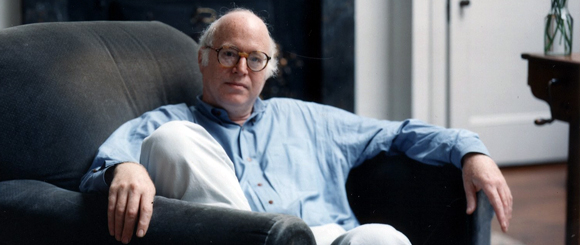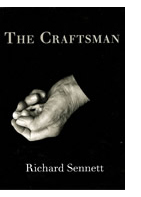| Sun | Mon | Tue | Wed | Thu | Fri | Sat |
|---|---|---|---|---|---|---|
| 1 | 2 | 3 | 4 | 5 | ||
| 6 | 7 | 8 | 9 | 10 | 11 | 12 |
| 13 | 14 | 15 | 16 | 17 | 18 | 19 |
| 20 | 21 | 22 | 23 | 24 | 25 | 26 |
| 27 | 28 | 29 | 30 | 31 |
CATEGORIES
RECENT ENTRIES
BLOG ROLL
The Craftsman cometh

From Wall Street to the woodshop, Richard Sennett wants to honor good work for its own sake.
In 2010 Richard Sennett's (AB’64) latest book, The Craftsman (Yale University Press, 2008), won Italy’s Mazzotti Literary Prize; he also received the Spinoza Prize for his contributions to debates on ethics and morality, and an honorary doctorate from Cambridge University.
A sociologist and essayist who studies labor, cities, and culture, Sennett divides his time between New York University and the London School of Economics. Trained at Juilliard as a classical musician, he has also written novels—so the man knows something about craft.
On a bitterly cold evening in December, Sennett packed the auditorium at the School of the Art Institute for a talk about craftsmanship, which he defined as “doing good work for its own sake.” At a time when recession and economic uncertainty make doing any work difficult, the topic seemed particularly apt.
Craftsmen can be male or female, said Sennett. They work as carpenters, orchestra conductors, lab technicians, or in any setting “in which sentiments and ideas can be investigated.” Master craftsmen, he believes, require roughly 10,000 hours of experience to attain a high level of skill. They take pride in their work and represent "the special human condition of being engaged.”
In a global, high-tech economy, Linux programmers who create free, open-source software are practicing “a public craft, the newest craft we have,” says Sennett. Linux systems draw highly skilled code writers to the Internet, where they exchange wares "in an electronic bazaar.” As with all quality craftsmanship, their work involves “an experimental rhythm of problem solving and problem finding … It’s always an attempt to see, ‘If I can do this, what can I do next?’” In contrast, the mediocre products of proprietary software companies like Microsoft represent "the anti-craft," says Sennett.
Sennett's talk and scholarship have analyzed the forces impeding craftsmanship, community, and creativity in the "new economy" in formation since the 1990s. Drawing on interviews that he and his students conducted with skilled laborers in several industries, he shared some findings:
- In new-economy firms, workplace teams are common. But midlevel employees at many such firms allege that friendliness and cooperation are often faked to impress superiors. Team principles “evaporated the moment an actual problem arose,” replaced with the attitude of “save yourself.”
- Older workers believe their service and experience don’t count for much; in fact, “as experience accumulates, it loses institutional value.” Sennett and his students asked their subjects the age at which people in their field began treating them as “over the hill.” In law, it was 50 to 52; in advertising, it was late 30s; in engineering, it was 31.
- Back-office accountants who left jobs on Wall Street following the 2008 crash believed that “people at the top were uninterested in their skills and oftentimes were themselves incompetent at understanding what the back office was doing.” Skilled workers see craftsmanship as having “an inverse relationship to authority.” Hard work doesn't always bring financial reward and over the past generation, the wealth share of midlevel employees has stagnated while that of CEOs has ballooned.
 The problem, says Sennett, “is not simply that people are getting rich off craftsmen,” but also that skilled workers see “an inverse relationship between competence and power.” In the United States especially, “we think of ourselves as a skills economy, but the value of the people who possess that skill has become marginalized.”
The problem, says Sennett, “is not simply that people are getting rich off craftsmen,” but also that skilled workers see “an inverse relationship between competence and power.” In the United States especially, “we think of ourselves as a skills economy, but the value of the people who possess that skill has become marginalized.”
The solution, he believes, is to “think radically,” as the ancient Greeks and Marx did, about “changing our economy and our social mores so they are founded upon honoring the skills of the people who have them.”
Until that bright day comes, we can read his book.
Elizabeth Station
January 12, 2011
